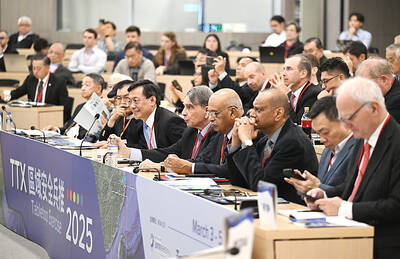The increased use of computers in recent years has caused presbyopia — a common vision condition that normally affects people over 40 years old — to be diagnosed at a younger age, an ophthalmologist said yesterday.
Presbyopia is a condition where the eye gradually loses its ability to focus on close objects.
“I now have patients in their 30s coming to me with symptoms of presbyopia,” said James Liau (廖士傑), chief of the Shu-Tien Ophthalmology Clinic.
Common symptoms include difficulty reading under low lighting, experiencing pain in the eyebrow area after reading for long periods of time and momentarily blurred vision when switching between looking at far and near objects, Liau said.
“[People with severe presbyopia] say their arms have become too short, because they must hold whatever they are reading at farther and farther distances,” he said.
While people with myopia, or nearsightedness, may not develop presbyopia until they are as old as 50, it will eventually develop as one gets older, similar to graying hair.
Various factors and habits could cause presbyopia to develop at a younger age than normal, such as hyperopia, or farsightedness, poor reading habits and using the computer for long periods of time without resting, Liau said.
The most common way of dealing with presbyopia is corrective lenses, available as eyeglasses or contact lenses.
As the condition becomes more advanced, the prescription needs to be changed in order to “catch up” with the worsening abilities of the eye, Liau said.
When presbyopia becomes severe, a method called monovision can be used, he said.
Monovision involves the patient using contact lenses to correct one eye for near vision and the other for far vision.
“The brain will automatically filter and choose the correct image perceived by both eyes,” Liau said.
However, some patients using the monovision method say they have difficulty adjusting because the method affects depth perception, making it harder to judge whether something is near or far, he said.
The US Food and Drug Administration is researching techniques to cure presbyopia through surgical techniques.
If surgical reversal of presbyopia were approved, patients would not need to wear corrective lenses, Liau said.
Even though presbyopia cannot be prevented, it can be delayed by habits such as improving reading conditions, letting the eyes rest for three minutes every 30 minutes when using computers, massaging the temples, consuming dark-colored vegetables — such as tomatoes and carrots — and wearing sunglasses to avoid ultraviolet exposure, Liau said.

Actor Darren Wang (王大陸) was questioned by prosecutors for allegedly orchestrating an attack on a taxi driver after he was allegedly driven on a longer than necessary route in a car he disliked. The questioning at the New Taipei City District Prosecutors’ Office was ongoing as of press time last night. Police have recommended charges of attempted murder. The legally embattled actor — known for his role in the coming-of-age film Our Times (我的少女時代) — is under a separate investigation for allegedly using fake medical documents to evade mandatory military service. According to local media reports, police said Wang earlier last year ordered a

President William Lai (賴清德) should protect Taiwan Semiconductor Manufacturing Co (TSMC), and stop supporting domestic strife and discord, former president Ma Ying-jeou (馬英九) wrote on Facebook yesterday. US President Donald Trump and TSMC on Monday jointly announced that the company would invest an additional US$100 billion over the next few years to expand its semiconductor manufacturing operations in the US. The TSMC plans have promoted concern in Taiwan that it would effectively lead to the chipmaking giant becoming Americanized. The Lai administration lacks tangible policies to address concerns that Taiwan might follow in Ukraine’s footsteps, Ma wrote. Instead, it seems to think it could

A man in Tainan has been cleared on charges of public insult after giving the middle finger during a road rage incident, as judges deemed the gesture was made “briefly to express negative feelings.” In last week’s ruling at the High Court’s Tainan branch, judges acquitted a driver, surnamed Cheng (程), for an incident along Tainan’s Nanmen Road in September 2023, when Cheng had spotted a place to park his car in an adjacent lane. Cheng slowed down his vehicle to go into reverse, to back into the parking spot, but the car behind followed too closely, as its driver thought Cheng

DEFENSE: The purpose of the exercises is to identify strategies for the government to control risks during tensions, prevent war and bolster national resilience A tabletop exercise series has begun simulating possible scenarios if the Chinese People’s Liberation Army (PLA) launched a war against Taiwan in the guise of a military exercise. The exercise series is jointly organized by National Chengchi University’s Institute of International Relations, Taiwan Center for Security Studies and Asia-Pacific Policy Research Association. Chinese Nationalist Party (KMT) Legislator Chen Yeong-kang (陳永康), former American Institute in Taiwan (AIT) director William Stanton and Taiwan Center for Security Studies director Liu Fu-kuo (劉復國) attended the event in Taipei yesterday. Scenarios that would be simulated include changing political circumstances in the US during US President Donald Trump’s tenure